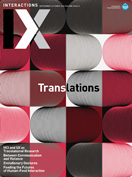Authors:
Daniela Rosner, Alex Taylor, Mikael Wiberg
It is with great pleasure that we introduce a number of exciting changes at the magazine, including new regular contributors, new formats, and new experiments. One of our most substantive developments has been to organize the magazine around particular issues or topics. Our hope is that by putting together a number of pieces per issue that discuss a coherent theme, we might engage you, as readers, on topics of personal, professional, and societal significance, and we might do so with a bit more nuance and with greater depth and purpose than before.
We begin this thematically led content with the topic of translations—the very ways in which we articulate ourselves and our work across varied professional, academic, and community contexts. Translations most often refer to the movement of meaning between languages, where words spoken or rendered in one language transform into another. But the term has also emerged within research fields, including the worlds of design and technology development, where the idea has received increased attention as a call for addressing everyday and long-term stakes. Whether as outreach or broader impact, translations often signify the movements and transformations of research insights as they reach wider audiences, be they stakeholders or users (or, as is often the case, those whom the research inadvertently and unconscionably affects). In this respect, translations lie at the core of our academic mission at Interactions: specifying the kinds of work it takes to communicate within and across diverse fields and audiences.
Translations lie at the core of our academic mission at Interactions: specifying the kinds of work it takes to communicate within and across diverse fields and audiences.
To complement this focus, the current issue of Interactions inaugurates a new format called Dialogues, a type of contribution that establishes the central thematic anchor for each issue (here, translations!). Dialogues introduces a topic from a number of perspectives that each engage and expand conversations on a major theme in IX, HCI, design, and beyond. The format then complements other regular content forms such as columns and forums, many of which also respond to the theme.
In this issue's Dialogues, we asked two authors to work together: HCI-for-development scholar Melissa Densmore and Lucas Colusso, a UX designer whose research focuses on moving HCI research insights beyond the academy. We invited the pair to imagine the dialogue as a conversation, which took them across the geographies (and time zones) of Cape Town, South Africa, and Seattle, Washington, in the U.S. In the spirit of translations, Lucas has also translated the Dialogues into Portuguese—the first Portuguese-language publication in the magazine, and hopefully a harbinger of many more multilingual translations to come.
Expanding this reflection, several additional contributors unpack the possibilities (and trials) of translation. Using a range of personal and scholarly examples, Yolanda Rankin, Jakita Thomas, and Nicole Joseph highlight the need for intersectional approaches and what gets lost in translation around HCI's racial justice initiatives. Roderic Crooks complements this analysis with vital cautionary tales of translations, and Ignacio Acosta visualizes their politics of extraction. Elizabeth Churchill ruminates on the limits and potentials of translation, while Rosanna Bellini and Angelika Strohmayer discuss their own attempts to make meaning of translation and its stakes.
By attending to translations near and far, we are embarking on a slow and hopeful experiment. Come join us!
Daniela Rosner, Alex Taylor, Mikael Wiberg [email protected]
Copyright held by authors
The Digital Library is published by the Association for Computing Machinery. Copyright © 2020 ACM, Inc.








Post Comment
No Comments Found